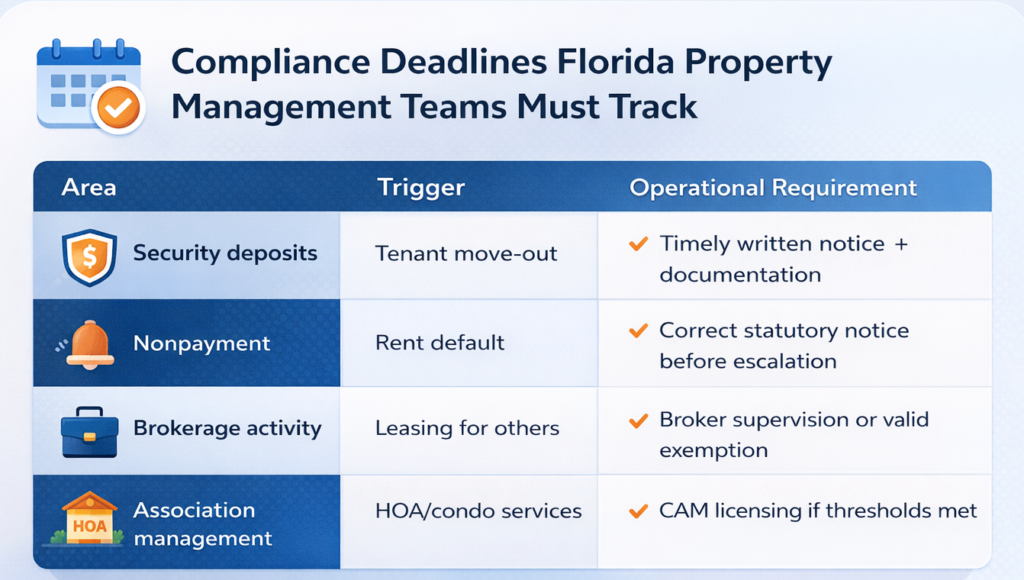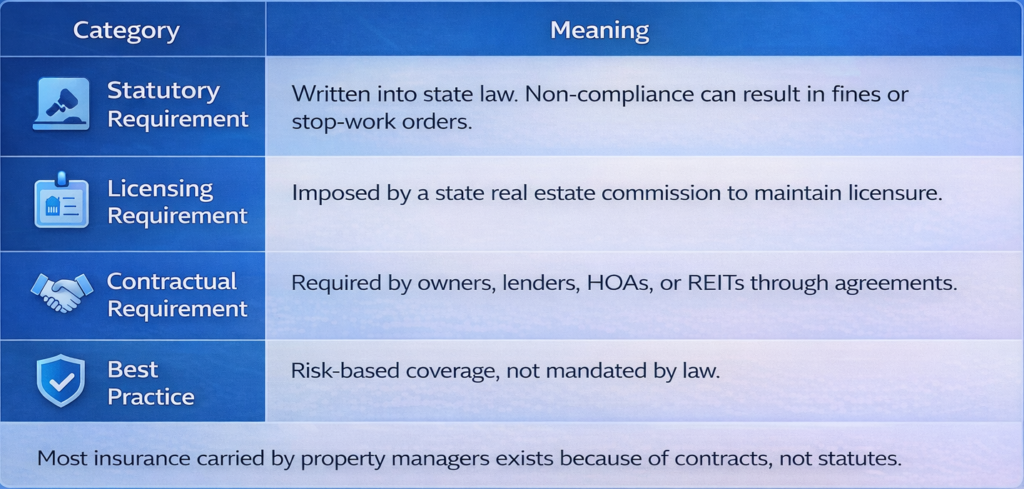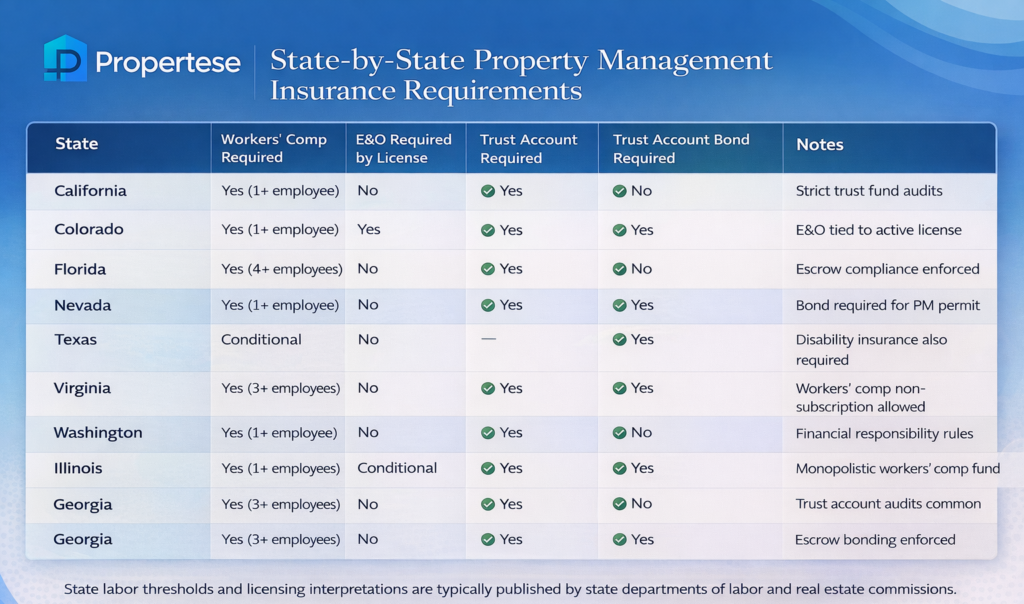New York Property Management Regulations: NYC & Statewide Requirements
Property management in New York operates under one of the most complex regulatory environments in the United States. Statewide licensing rules, trust account obligations, and landlord-tenant laws apply across New York, while New York City layers on additional housing, consumer protection, and administrative requirements that materially change day-to-day operations.
This guide explains how New York property management regulation works in practice, what applies statewide, what changes inside NYC, and where property managers most often face compliance risk.
How Property Management Is Regulated in New York
There is no separate “property management license” in New York. Instead, regulation flows through three overlapping systems:
- New York State real estate licensing law
- State landlord-tenant statutes
- Local law and agency enforcement (especially in NYC)
Property managers are regulated as real estate brokers or salespersons when they manage property for others and collect rent, security deposits, or other client funds.
Primary Regulatory Authorities
- New York Department of State (DOS), Division of Licensing Services – licensing, trust accounts, audits, discipline
- New York State Legislature / Real Property Law (RPL) – statewide landlord-tenant rules
- NYC Housing Preservation & Development (HPD) – housing code enforcement
- NYC Department of Housing and Community Renewal (HCR) – rent stabilization
- NYC Department of Consumer and Worker Protection (DCWP) – advertising and consumer protections
Licensing Requirements for Property Managers in New York State
When a License Is Required
Under New York Real Property Law §440, anyone who manages real property for others and performs activities such as:
- collecting rent,
- handling security deposits,
- negotiating leases, or
- supervising occupancy
must hold an active New York real estate broker license or operate under one.
This applies regardless of:
- residential vs commercial property,
- number of units, or
- whether management is the company’s primary business.
Property management is not exempt from broker licensing simply because no sales occur.
Broker vs Salesperson Roles
- Broker: May own the management company, open trust accounts, and supervise compliance
- Salesperson: May assist with leasing and management, but cannot control trust accounts
Trust Account Rules for New York Property Managers
Handling client funds is one of the highest-risk areas for New York property managers.
When Trust Accounts Are Required
Trust (escrow) accounts are required when property managers hold:
- tenant security deposits,
- advance rent,
- rent collected on behalf of owners, or
- owner reserve funds.
Funds must be kept separate from operating accounts and held in a fiduciary capacity.
Security Deposits (Statewide Rule)
Under New York General Obligations Law §7-103, security deposits:
- must be held in a New York banking institution,
- cannot be commingled with personal or business funds, and
- remain the property of the tenant.
For buildings with six or more residential units, deposits must be placed in interest-bearing accounts, with interest paid to tenants annually (less a 1% administrative fee).
Statutory source:
https://www.nysenate.gov/legislation/laws/GOB/7-103
Broker Trust Account Recordkeeping
The New York Department of State requires brokers to:
- maintain detailed escrow records,
- reconcile trust accounts regularly, and
- retain records for at least six years.
Failure to maintain proper escrow records is a common basis for disciplinary action.
Statewide Landlord-Tenant Rules Property Managers Must Follow
Property managers act as agents of the owner and are legally responsible for compliance with state landlord-tenant law.
Key statewide requirements include:
Security Deposit Limits & Returns
Under the Housing Stability and Tenant Protection Act (HSTPA):
- Security deposits are capped at one month’s rent
- Deposits must be returned within 14 days of move-out
- Itemized deductions must be provided
Late Fees
Late fees are limited to:
- the lesser of $50 or 5% of monthly rent
- only after rent is at least 5 days late
Evictions & Notices
New York has strict notice requirements for:
- nonpayment,
- holdovers, and
- lease violations.
Improper notice is one of the most common reasons eviction cases are dismissed.
NYC-Specific Property Management Rules (Where Things Change)
New York City imposes additional requirements that do not apply statewide.
NYC Housing Maintenance Code
Property managers in NYC must comply with the Housing Maintenance Code, enforced by HPD, covering:
- heat and hot water,
- mold remediation,
- lead paint,
- pests,
- habitability standards.
Violations are tracked publicly and can trigger inspections, fines, and litigation.
Rent Stabilization
Many NYC properties are subject to rent stabilization, which governs:
- rent increases,
- lease renewals,
- security deposits,
- service reductions.
Property managers are responsible for:
- registration filings,
- lawful rent calculations,
- responding to tenant complaints.
NYC Advertising & Consumer Rules
The NYC Department of Consumer and Worker Protection (DCWP) regulates:
- advertising practices,
- fee disclosures,
- deceptive or misleading listings.
Misleading rental ads can result in penalties even if no lease is executed.
Fair Housing & Anti-Discrimination Enforcement
New York property managers must comply with:
- Federal Fair Housing Act
- New York State Human Rights Law
- NYC Human Rights Law (one of the strictest in the country)
NYC law expands protected classes to include:
- lawful source of income,
- immigration status,
- gender identity and expression,
- domestic violence survivor status.
Refusing vouchers, applying different screening standards, or delaying responses can trigger enforcement.
Recordkeeping, Audits, and Enforcement Risk
State Audits
The NY Department of State can audit brokers for:
- trust account compliance,
- escrow records,
- licensing violations.
Audits often begin after:
- tenant complaints,
- owner disputes,
- license renewal reviews.
NYC Enforcement
NYC agencies may inspect, fine, or litigate based on:
- housing code violations,
- registration failures,
- tenant complaints.
In practice, most enforcement actions are won or lost on documentation, not intent.
Operational Compliance Best Practices
To manage New York property management risk effectively:
- Use segregated trust accounts with clear ledgers
- Reconcile escrow accounts regularly
- Apply screening criteria consistently
- Track NYC registrations and filings
- Document maintenance and repairs
- Train staff on NYC-specific rules
- Maintain written policies for audits
Property management platforms like Propertese help centralize:
- trust accounting,
- rent tracking,
- maintenance records,
- compliance documentation
so property managers can respond quickly to audits and agency inquiries.
Final Takeaway
New York property management compliance is not optional and not static.
Statewide rules establish the baseline, but NYC requirements materially change how property managers must operate, especially around trust accounts, rent regulation, advertising, and tenant protections.
Property managers who succeed in New York are not those who “know the rules,” but those who build systems that prove compliance on demand.
Managing New York property management requirements demands accurate records, consistent processes, and audit-ready systems.
If you want a platform that supports trust accounting, rent tracking, maintenance documentation, and compliance workflows in one place, Contact Propertese to see how it fits your portfolio.



